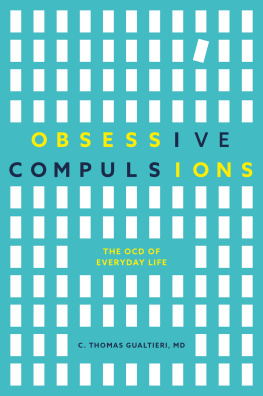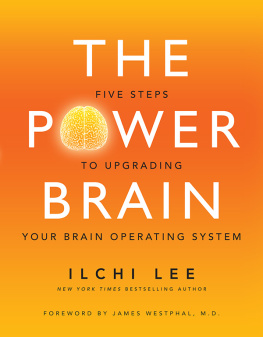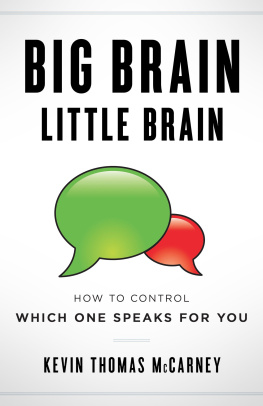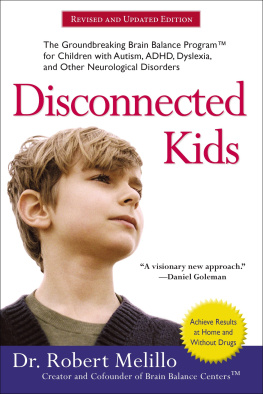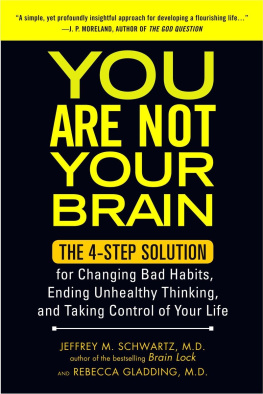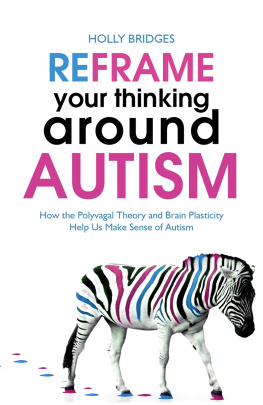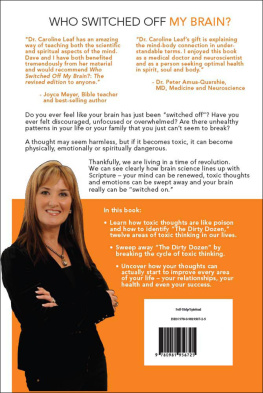
OBSESSIVE
COMPULSIONS
THE OCD OF EVERYDAY LIFE
C. Thomas Gualtieri, MD

Jessica Kingsley Publishers
London and Philadelphia
Contents
Introduction
The book is about obsessive compulsiveness (OC), not obsessive-compulsive disorder (OCD). If we limited ourselves to pathological cases, that would prevent us from understanding the idiosyncrasies that make some normal people endearing and others unbearable. What is OC? Its the way a lot of people are. Let me explain.
In Dunedin, a small city in New Zealand, psychologists at the university recruited 1037 newbornsall the babies born in Dunedin in 1972. The goal was to track the childrens health and developmental progress. The program went so well that the kids have been tested at regular intervals ever since. When they reached age 32, the study took a new turn. Researchers from London, Barcelona, Sydney and North Carolina joined psychologists from the University of Otago to investigate the symptoms of obsessive-compulsive disorder, or OCD. They discovered that most of the subjects were healthy and free of any mental disorder. However, among normal young adults, no fewer than 42 percent said they were bothered by obsessions, and 45 percent by compulsions (Fullana et al ., 2009). They didnt have OCD. They were OC.
OCD is a mental disorder, but being OCthat is, having a few of the symptoms of OCDisnt a disorder at all. Its the way many people are. In Zurich, several hundred healthy individuals, representative of the general population, were interviewed seven times between the ages of 20 and 50. Twenty-two percent had at least some OCD symptoms, but not OCD (Fineberg et al ., 2013). In Cairo, 26 percent of college students had OC traits and 43 percent had OC symptoms (Okasha et al ., 2001). The rates were higher in Israel: among 16-year-olds appearing for pre-induction examinations, 72 percent said that they had OC symptoms (Apter et al ., 1996). In Toronto, a study of 16,718 children and adolescents reported that 45 percent had at least one OC trait and 31 percent had two or more (Park et al ., 2016). In the USA, almost half of all women experience obsessions or compulsions during the postpartum period (Miller, Hoxha, Wisner, and Gossett, 2015). Finally, in two studies of American college students, the rate of obsessions was higher than 80 percent (Muris, Merckelbach, and Clavan, 1997; Rachman and de Silva, 1978; Salkovskis and Harrison, 1984).
OC is the OCD of everyday life. Of all the mental disorders, the symptoms of OCD merge most closely with normal human behavior and cultural traditions (Hollander, Kim, Khanna, and Pallanti, 2007). One prominent OCD expert wrote that OC experiences occur in 90% of people at one point or another in their lives (Pallanti, 2008). OC experiences are similar in form and content to those of patients with OCD, but they are less intense, less frequent, and less disabling. Mostly they are innocent foibles, but sometimes they cause problems. When OCs seek help, they are usually misdiagnosed with depression, anxiety, attention deficit disorder (ADD), bipolar disorder or autism (Fullana et al ., 2010).
OC is a common trait. My estimate is that 30 percent of us have it, to one degree or another. It is especially common in people who are intelligent and well-educated. There is something about being smart that can make one a bit too self-absorbed, eccentric or controlling, oras in the case of my friend Milesall three. Something as pervasive as OC, and as misunderstood, deserves a close look.
OC is the source of many of the problems we make for ourselves, but this isnt a self-help book: How Not To Be OC . There are bad OCs, like those angry, controlling men youve probably encountered along the way. They need help, but more than they can get from a book. There are unhappy OCs, too, people riven by anxiety and fears, and those who are so occupied with getting it right that they never get it at all. There are OCs who are convinced they have attention deficit disorder: they often take medications that make their attention worse and their OC. Most OCs, however, are happy, productive individuals; theyre just a little weird, sometimes.
Nor is this book about an epidemic of OC. We need to arrest it before it corrupts the human race and some other species will evolve and take our place . As it happens, there is an epidemic of OC, but Im not an alarmist because its mostly good OC. So, we shall meet a man whose obsession with venomous snakes has saved hundreds of lives, and another fellow who assembled the largest collection in the world devoted to any one fruit. Where would we be if it werent for such men, or for other like-minded soulsthe fussy men and women, the Great Detectives and other Great Minds who have walked among us, the Ditzy Blondes, and children with such active minds that they seem to be evolving before our very eyes. If you take such a child to a mental health professional, hes likely to be diagnosed with ADD or else as on the spectrum.
We shall meet some other characters, too, whose frailties are best understood when one understands OC. The SAs, people with the traits of social anxiety, dont have social anxiety disorder but are exquisitely sensitive to the unpredictable and irrational nature of social intercourse. Most SAs have OC traits. OC and SA tend to cluster in families, along with Aspergerism, which is a not-quite-pathological variant of autism. SAs are given to flights of fantasy and Aspergerites can do wonders with mathematical formulae and computer programs. Where would we be without them? Narcissists are here, too, and I shall try my best to say something good about them. You dont have to be a narcissist, though, to be obsessively self-absorbed.
OC explains so many mysteries of the human condition that its possible it explains nothing at all. That is the risk an author takes when he introduces a new theory. But this book isnt about a theory; it is only about observations of the human condition.
I dont have special powers as Sherlock had, but I am a neuropsychiatrist and my patients have brain-based disorderslearning disabilities, autism, dementia and brain injuries. My colleagues and I also see patients with unusual or hard-to-diagnose psychiatric conditions. Many are OC or SA, or both, and their traits have often been overlooked by other clinicians. Since I dont have the Great Detectives gifts of clarity and intuition, I worry that my explanations may be turgid, at times. After all, I shall be giving you Brain Scienceand the latest news from Brain Science, tooalthough its only to complement my observations. OC provides a window into how the mind works, and the brain. So, this is a brain-book, I suppose. Its not one of those books that drubs you with how complex the brain is, yet its circuits are less complicated than the wiring diagram of my daughters Volkswagen (which I am trying to fix). No, this is a brain-book with humility . My premise is that brains are as naive and simple-hearted as people are themselves. Nevertheless, there is something about our brains that makes a good number of us fussy, perfectionistic, eccentric, worrisome, hypochondriacal, uptight, rigid, angry or controlling. Something in our brains can tangle us up in our own cogitations; something else can confer meaning to the most ordinary things we do. There are also mysterious regions in the brain and neural processes that we dont understand very well. In such cases, I shall make something up.
What, then, is OC? Its a lot of things, depending on the perspective one takes or the neural processes one wants to highlight. Stripped to its essentials, OC is an excess of mental energy that finds
Next page
